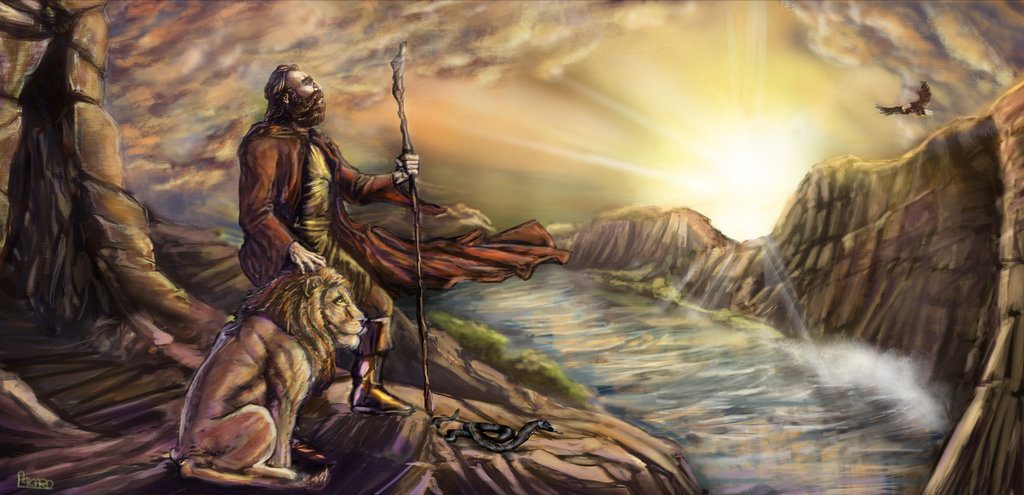Zoroastrianism was a dualist faith that originated in Persia, and over the years it has influenced a number of other faiths. Even though we may not recognize it today, it has been an influence on a number of world religions, especially on Christianity and Islam. Zoroastrianism is a belief system that stresses how we as human beings were meant to strive for our full potential. A primary tenet of the faith is that righteous and upstanding people will participate in the rewards of paradise, while the evil-doers will undergo punishments in hell.1
The prophet and founder of Zoroastrianism was Zarathustra, a man from an aristocratic family in Rhages, Media. Most scholars believe that Zarathustra was born around the late seventh and early sixth centuries B.C.E. He was a priest who became disillusioned with Persian ancestral religion, so instead he decided to search for inspiration and wisdom, and for a deeper meaning to life. After ten years of traveling, he finally realized that he had been called to be a prophet of Ahura Mazda, the Lord of Light. “He received a revelation in the form of the Avesta, the holy book of his religion, and commissioned to preach to humankind.”2 He would preach the Gathas; these were known as the hymns to the gods.
The central claim of Zoroastrianism is that there are two coequal and co-eternal gods: Ahura Mazda, the All-knowing Lord of Light, and Angra Mainyu or Ahriman, the Lord of Darkness. These gods represent an extreme dualism, where followers were given the option of choosing whom to worship. Ahura Mazda would save or condemn individuals based on whichever choice they decided to make.3 The people would experience rewards and punishments based on how they chose to behave. If they followed “Good words, Good thoughts, Good deeds,” they would be able to appreciate all the pleasures Ahura Mazda had in store for them in the afterlife.4

Devotees of Zoroastrianism believed that Ahura Mazda first produced the World of Thought and then gave birth to the World of the Living; but there was not yet life. Angra Mainyu challenged this pre-creation with his own counter-creation in order to destroy what Ahura Mazda was establishing. The Lord of Darkness wanted to demolish it with darkness, sickness, and death. Before Angra Mainyu was able to attack, Ahura Mazda forced him to recoil to the darkness. He was stunned into unconsciousness for three thousand years.5
Ahura Mazda then prepared for the Mixture of war, or battles against evil. This war was going to last six thousand years. For the first three thousand years, Ahura Mazda would unite with other lesser gods so that they could form a broad alliance. Angra Mainyu’s evil queen helped awaken the evil-doer and stirred all evil beings to attack Ahura Mazda. The battle then began, and Ahura Mazda’s creation came to life. Unfortunately, the very first beings killed were good, Gayomard and the Lone Bull; but from their semen they were able to manifest all humankind and bring into being all animals. Ahura Mazda’s right-hand man was Karsasp, a beautiful and innocent man, who helped fight off Angra Mainyu and his servants. Ahura Mazda then put Karsasp into a deep sleep so he would be well-rested for the very Last Battle.6 “At death, according to the tenets of Zoroastrianism, the souls of all persons ascend to the summit of Mount Hara where the good and bad of each soul are weighed in balances.”7 If one has made exceptional choices, ones soul will cross the cosmic bridge and continue an existence in heaven. In the case that many of one’s decisions were unacceptable, the bridge will disrupt and one’s soul will perish in hell. Scholar Charles David Isbell summarizes the eschatology of Zoroastrianism this way: “Since evil will have become extinct, history will come to an end, good souls will receive immortal bodies and will live forever in the re-perfected earth ruled over by Ahura-mazda.”8
This religion has continued to be practiced for as much as three thousand years. There are still a few thousand devotees that continue to carry on the traditions of Zoroastrianism in Iran and in India today. This religion has faced many difficulties in its long history, especially during the seventh century C.E. when invading Arab Muslims conquered the land of Persia, the homeland of Zoroastrianism. The conquerors chose not to take away this religion altogether, but they did choose to put a financial burden on the Zoroastrian temples.9 Many fled to India, which is home today to many of their descendants, known as Parsis. Many of those who stayed in Persia ended up converting to Islam. Although it may not be practiced as widely today, it has made a considerable impact on other religions.
Christianity was one of those religions that may have been influenced by elements within Zoroastrianism. Scholar John R. Hinnells writes,
It is generally held that the form of the later Jewish and Christian concept of the devil or Satan was influenced by Iranian tradition. If this be accepted then it has serious implications for the understanding of the saviour or Messianic figure…. When [the devil] becomes truly demonic … then the savior is given a new task.10
That task, Hinnells believes, was to defeat a supernatural and evil being, which taps into Zoroastrian dualism. In fact, the beliefs in a Satan of evil pitted against a God of good, the belief in angels and demons fighting a cosmic war, and the belief in a savior figure who would save all of humanity from evil and sin are all elements deriving from Zoroastrianism.11 Zoroastrianism in its original form may be an obscure faith in today’s society, but its impact on the fundamental principles of many religions is evident and deserves our appreciation and acknowledgement.
- Jerry Bentley, Herbert Ziegler, Heather Streets Salter, Traditions & Encounters: A Brief Global History Volume 1 (New York, NY: McGraw-Hill Publishers, 2016), 95-99. ↵
- Salem Press Biographical Encyclopedia, 2015, s.v. “Zoroaster,” by J. Steward Alverson. ↵
- Funk & Wagnalls New World Encyclopedia, 2016, s.v. “Ahura Mazda.” ↵
- Bentley, Ziegler, and Street Salter, Traditions & Encounters, 96-97. ↵
- P. Oktor Skjærvø, “Good vs. Evil,” Calliope 15, no. 5 (January 2005): 8. ↵
- P. Oktor Skjærvø, “Good vs. Evil,” Calliope 15, no. 5 (January 2005): 8. ↵
- Charles David Isbell, “Zoroastrianism and Biblical Religion,” Jewish Bible Quarterly (2006). ↵
- Charles David Isbell, “Zoroastrianism and Biblical Religion,” Jewish Bible Quarterly (2006). ↵
- Bentley, Ziegler, and Street Salter, Traditions & Encounters, 97-98. ↵
- John R. Hinnells, Zoroastrian and Parsi Studies: Selected Works of Johr R. Hinnells (Burlington, VT: Ashgate Publishing Co., 2000), 46. ↵
- Bryan Rennie, “Zoroastrianism: The Iranian Roots of Christianity,” The Council of Societies for the Study of Religion vol. 36 no. 1 (2007): 3-5. ↵



89 comments
Luke Trevino
Very great article! It was mind blowing to me that I have never heard of this religion even though it has had a great impact on different religions. The thing that blew my mind was that it could of possibly been a great influence in Christianity and it’s crazy to hear that considering I am a Christian. Overall it was a very good article!!!
Steven Clinton
Great article. Before reading this, I have heard just a little about the story of Zoroastrianism, but now after reading, I have a complete picture. Zoroastrianism seems to have influenced many other religions of the modern day; especially Christianity, the ten commandments could have easily been influenced by the moral teachings taught in Zoroastrianism. Overall this was a great article. Keep up the good work!
Natalia Zuniga
Great article Jezel! I was really interested in what this article was about because of the eye-catching title. Wow, such an interesting religion and curious how it has influenced the common religions we knew to day, and much the belief has stuck through time. The photograph of Faravahar was great, as well as your cover graphic really caught my attention. Interesting article, great job!
Alyssa Vela
I’ve been taught about Zoroastrianism before, but I can’t say I ever truly learned about it. To say that I started reading this article under the impression that I had prior knowledge of it is an understatement. I believed that I knew all there was to know on the subject, but boy was I wrong. For example, I had no idea that many religions were branched off of Zoroastrianism. I enjoyed the article, because I was able to walk away with a lot of insight. Overall a great article!
Mariana Sandoval
I have a Persian friend that practices this religion but I still never knew much about it. But it’s interesting to see the parallels present in other religions that came from Zoroastrianism.
Amanda Cantu
Very interesting article! I really enjoyed reading and learning about it. I have heard of this religion but I didn’t really know anything about it so it was interesting to actually know more about it. I loved that you put the creation story into it. I think most religions have some story about our existence and how it was created so it was interesting to read theirs. Keep up the good work!
Andres Palacios
Amazing how I’ve never heard about Zoroastrianism before. It had definitely influenced most religions that we know about in today’s world, just as Christianity it stresses that humans have the right to fulfill their full potential and also that the people who do right will be able to reach paradise and those who do evil will be punished in hell.
Rachel White
I had never heard of this religion prior to reading this and furthermore, I was surprised to learn that Christianity may have been based off of it! Very impressed with this article, you did a great job explaining the religion thoroughly and have great sources that you seem to have studied adequately.
Christopher Repka
I am really impressed with this article. The structure of the article made it very approachable and easy to read, yet it remained very informative. I was impressed with the integrity of citations, and the article spurred interest for further research on the topic. Can’t wait to read more!
Analina Devora
Interesting how religions come to be and how much of an influence they have on the world. Reading the explanation of Zoroastrianism reminded me of many stories relevant in the world today such as Harry Potter (Death Eaters VS Good Wizards) and Star Wars (The Dark Side VS The Light). This article is extremely thorough and well researched! Well Done!